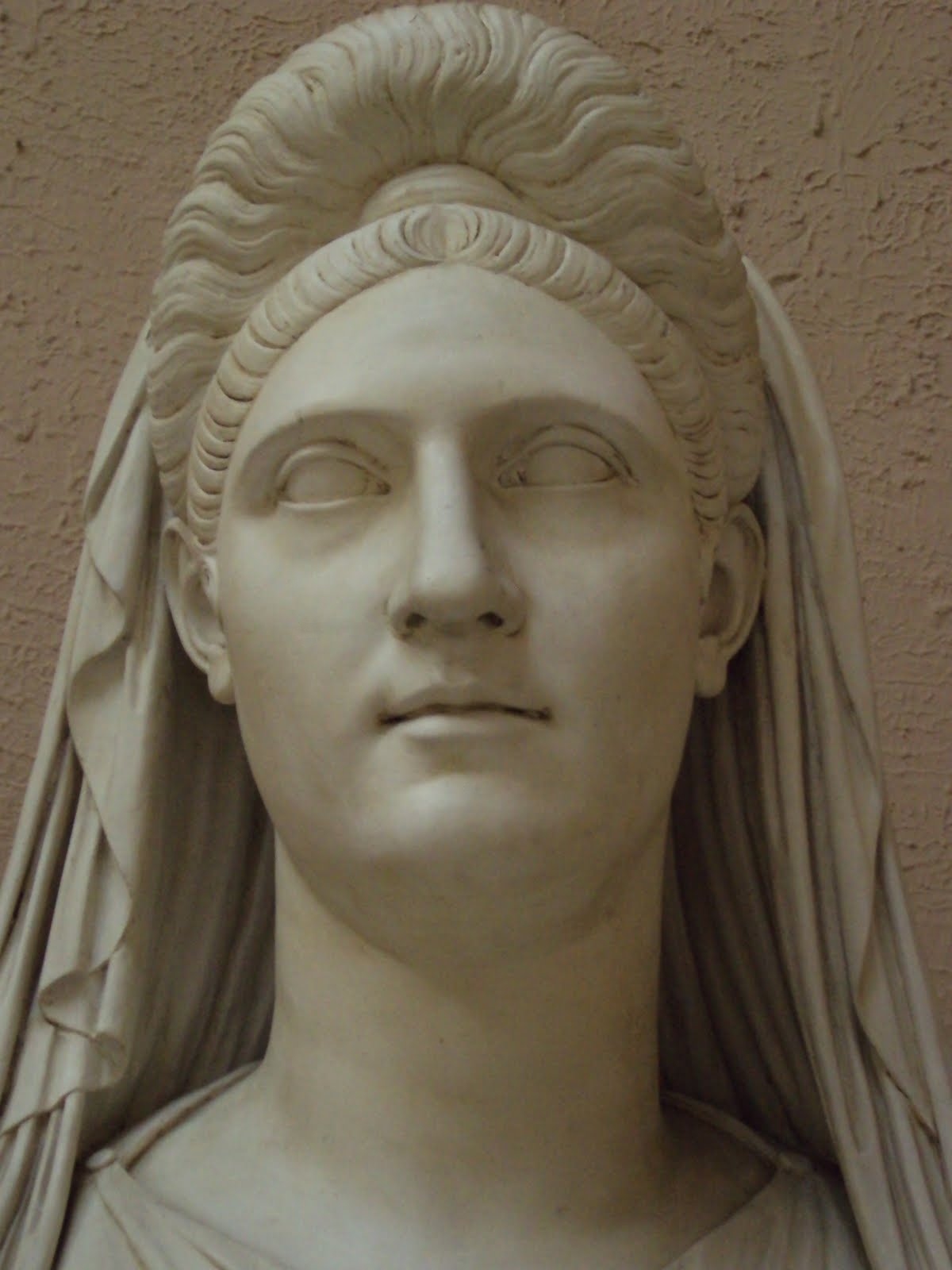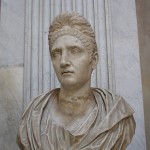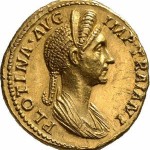The Ideal Epicurean Woman? Exhibit 1: Plotina, Wife of the Emperor Trajan
 Perhaps the most famous woman in history of whom we have a portrait, and of whom we can reasonably believe was a devout Epicurean, was Plotina, wife of the Emperor Trajan. Why do we have reason to believe she was an Epicurean? Because we have the following inscription of a letter from Plotina to her adopted son, the Emperor Hadrian, requesting his assistance with the Epicurean school in Athens. A portion reads as follows:
Perhaps the most famous woman in history of whom we have a portrait, and of whom we can reasonably believe was a devout Epicurean, was Plotina, wife of the Emperor Trajan. Why do we have reason to believe she was an Epicurean? Because we have the following inscription of a letter from Plotina to her adopted son, the Emperor Hadrian, requesting his assistance with the Epicurean school in Athens. A portion reads as follows:
“How greatly I favor the school of Epicurus you know full well, my lord. The succession therein needs your help, for since none but a Roman citizen may be elected head of the school the choice is narrowly limited. I pray therefore on behalf of Popillius Theotimus, who is now the head at Athens, that you will allow him to provide by will in Greek concerning that part of his instructions which pertains to the regulation of the headship, and to name a successor to himself of non-citizen status if he is so persuaded by the attainments of the person; and that future heads of the school may hereafter exercise with the same right the privilege you grant to Theotimus, all the more so because the practice is that whenever the testator errs concerning the choice of a head the best candidate is, by common consent, selected by the students of the school, and this will be easier if he can be chosen from a larger number.”
The inscription then includes a brief letter by Trajan granting the request, along with another from Plotina directly to the school. This letter would be fascinating to post here, and apparently it survives, but I cannot at present locate a copy on the internet.
What else do we know about Plotina? The following is based on information from Pliny:
When Plotina entered the palace after the ceremonies installing Trajan as emperor, she is reported to have promised the Romans that she would remain always the way she was at that moment. As empress, Plotina was greatly interested in the welfare of the Roman people and used her influence to promote greater equity of taxes and to provide assistance to orphans and the poor. She was born Pompeia Plotina Claudia Phoebe Piso in Nemausus (Nîmes), Gaul, during the reign of Nero (54-68 CE). Married to Trajan before he became emperor, she gained respect for the simplicity, virtue, dignity, and love of philosophy she brought to the imperial house; her images portray a serious woman of traditional mores. Happily married, Plotina and Trajan had no children; they adopted the young Hadrian, Trajan’s distant relative. In 105 CE, Plotina accepted the title Augusta, having refused it when it was offered in 100 CE; the title was first bestowed on Livia by Augustus in his will (14 CE) in recognition of her virtues. From 112 CE Plotina appears on coins issued by Trajan (see bronze sestertius) and after his death by Hadrian (see aureus), in honor of the purity of her family life. At her death in121/2 CE, the Senate voted to deify her, commemorating her with temples. In this excerpt from Pliny’s Panegyricus, a speech of thanksgiving to the Emperor Trajan, his only surviving speech, delivered in the Senate when he was consul in 100 CE (see his life and this site), Plotina is commended as a wife who complements her husband in both behavior and character (see this jugate cameo portrait, c. 105-115 CE).
The Encyclopaedia Brittanica records:
Pompeia Plotina, (died c. ad 123), wife of the Roman emperor Trajan. She earned great respect in her lifetime by her virtue and her advocation of the people’s interests. During the ceremony of Trajan’s accession, she is supposed to have turned around as she climbed the palace steps and addressed the crowd, saying that she desired always to be the same as she was then. One of her accomplishments was to curb the excesses of the procurators, the state’s revenue agents.
Plotina was childless. As Trajan lay dying at Selinus (Cilicia) in August 117, she induced him to adopt Hadrian, with whom she was on close terms. Plotina survived Trajan, and, upon her death, the emperor Hadrian had her deified and had temples erected in her honour at Rome and at Nemausus (Nîmes) in Gaul.
The authorities seem to agree that Plotina died in approximately 122 AD, so we have this date as a reference to conclude that significant interest in Epicureanism survived the years of the early Empire, and even the formal school in Athens was in existence well after 100 AD.
If the sources quoted above are correct, Plotina earned her renown as a virtuous Empress in ways that would have made the ancient Epicureans proud. Plotina still serves for us today as a model of the proper Epicurean way of life.
Note: There seem to be numerous variations of the bust of Plotina, so I should note that the photo I have used for Plotina comes from here on Roman-Empire.net. Somewhat more commonly, however, I see the bust shown here, which is conveniently labeled “Plotina” on the base of the bust.
I have not been able to determine whether my preferred portrait is in fact Plotina or someone else, but we can be pretty sure that the following coin, which is also labeled Plotina, must be accurate:
The page where this coin is shown is itself a fascinating compilation of female hairstyles from the Roman imperial period.



